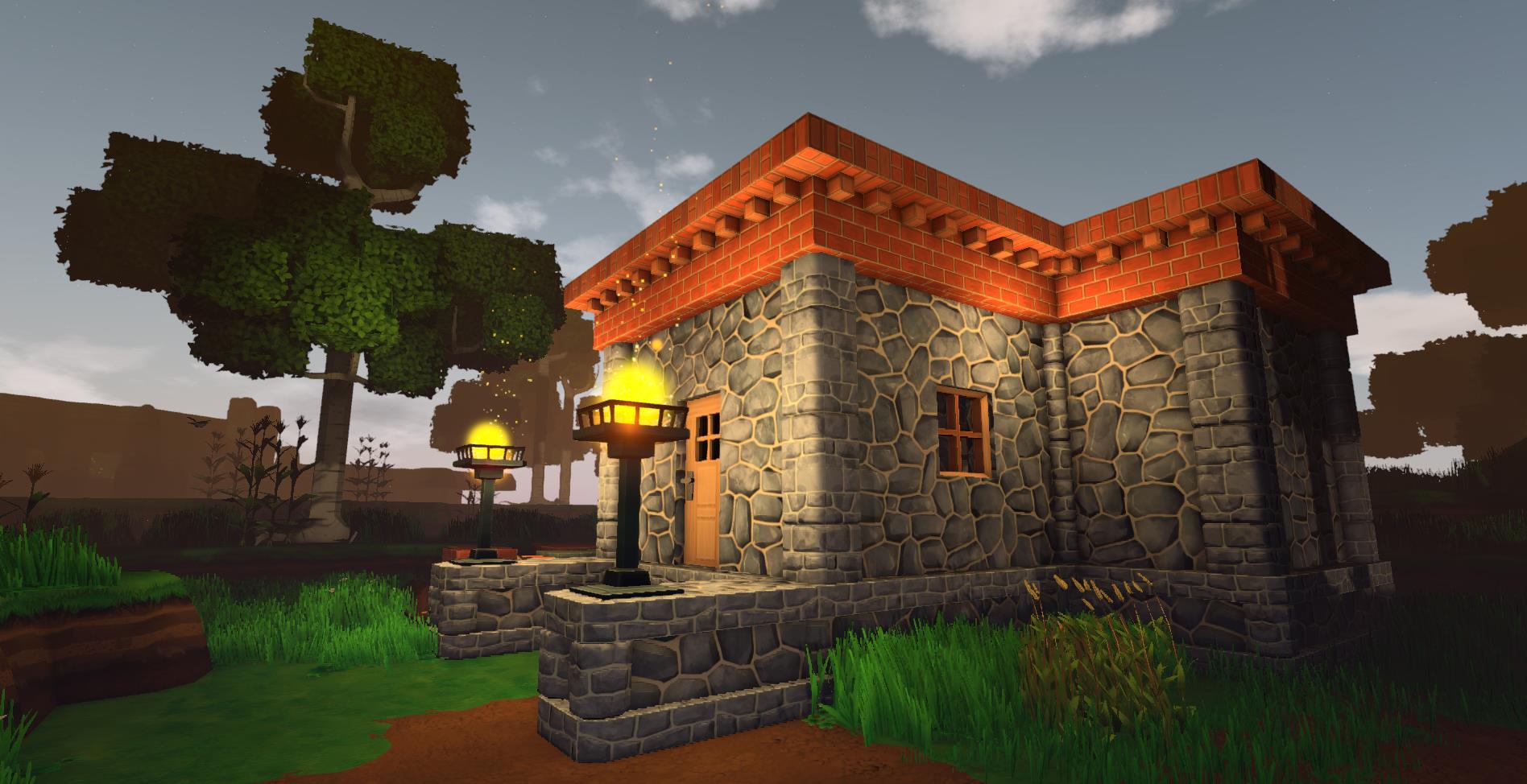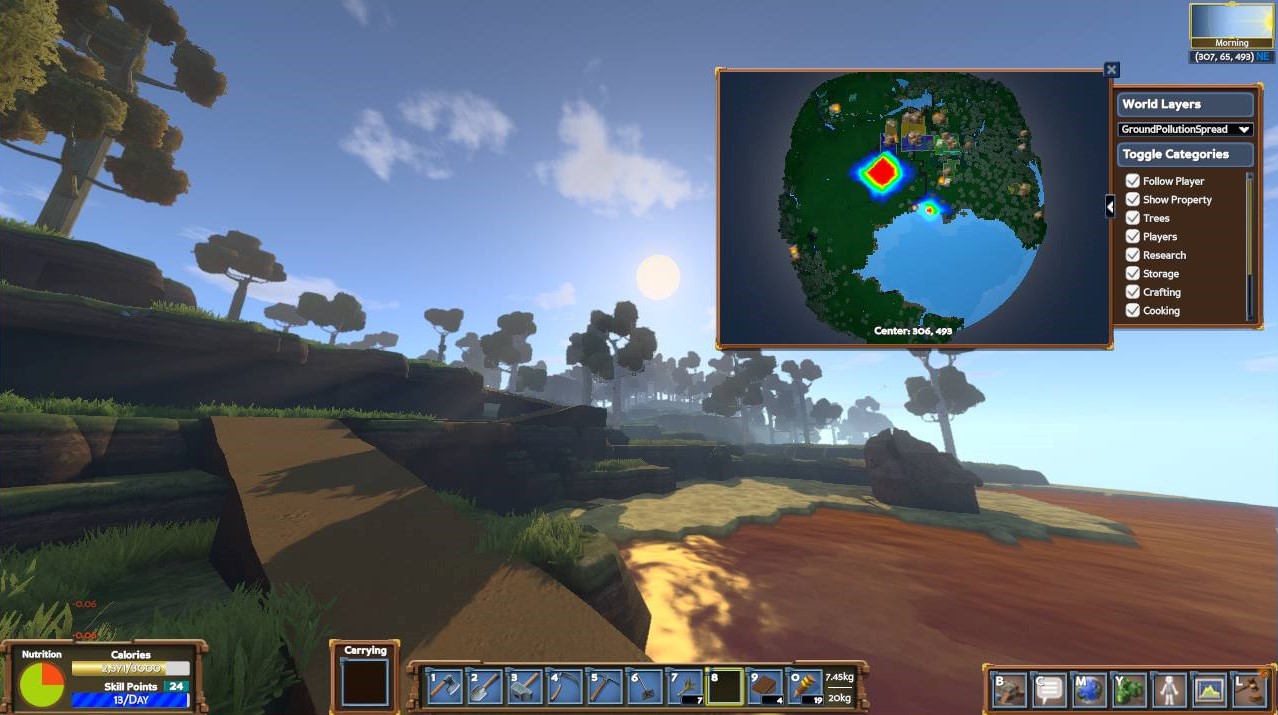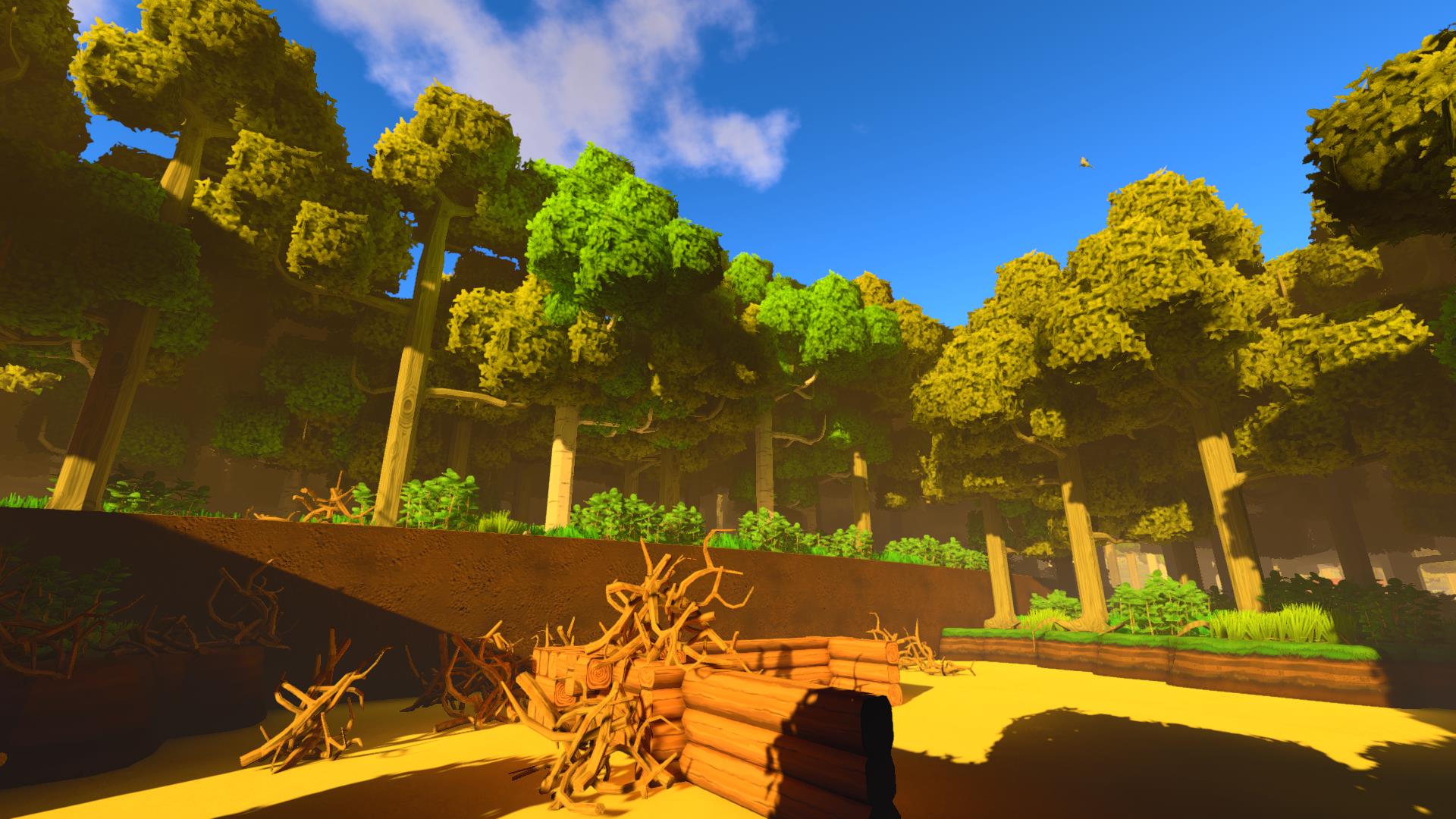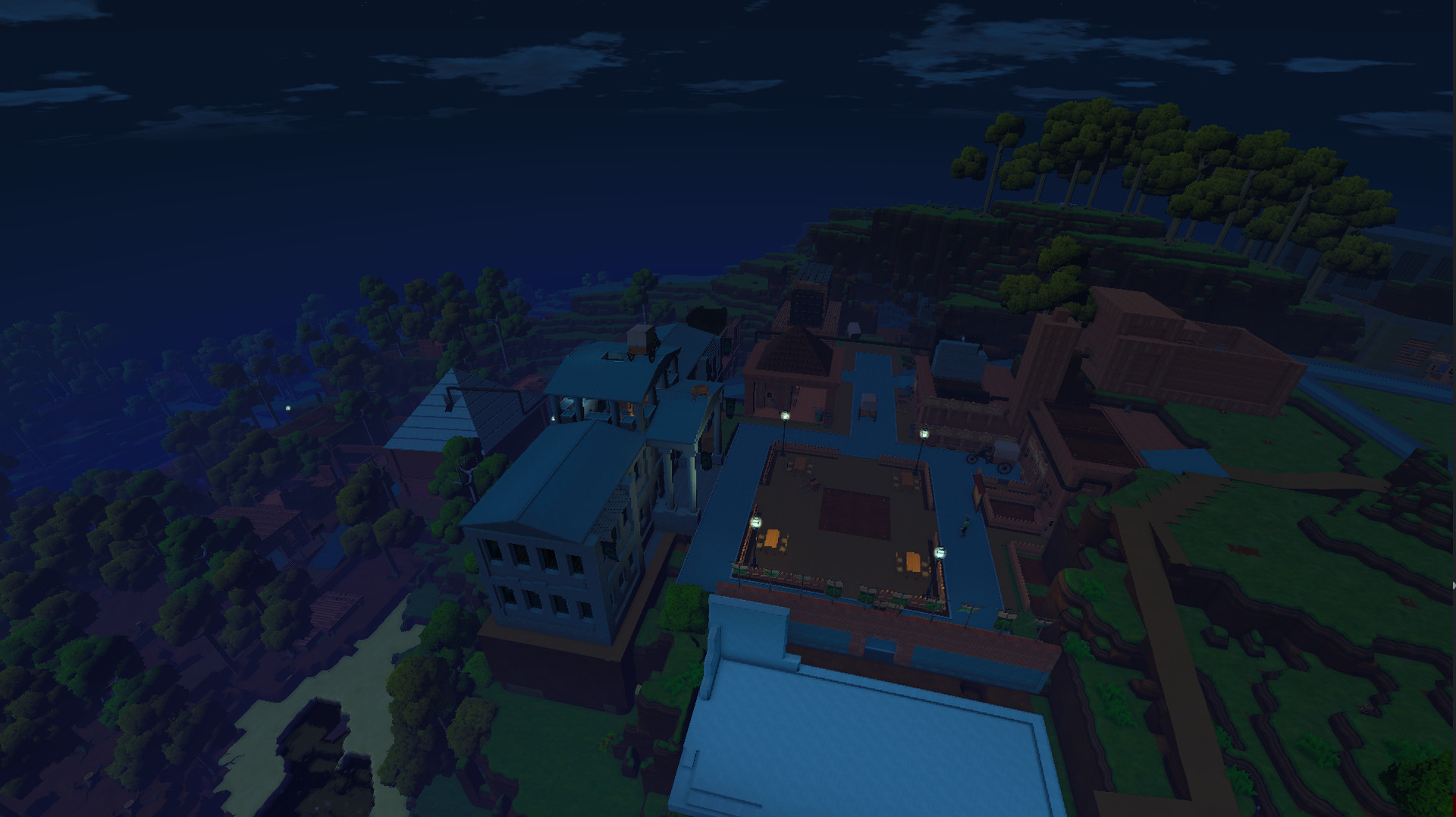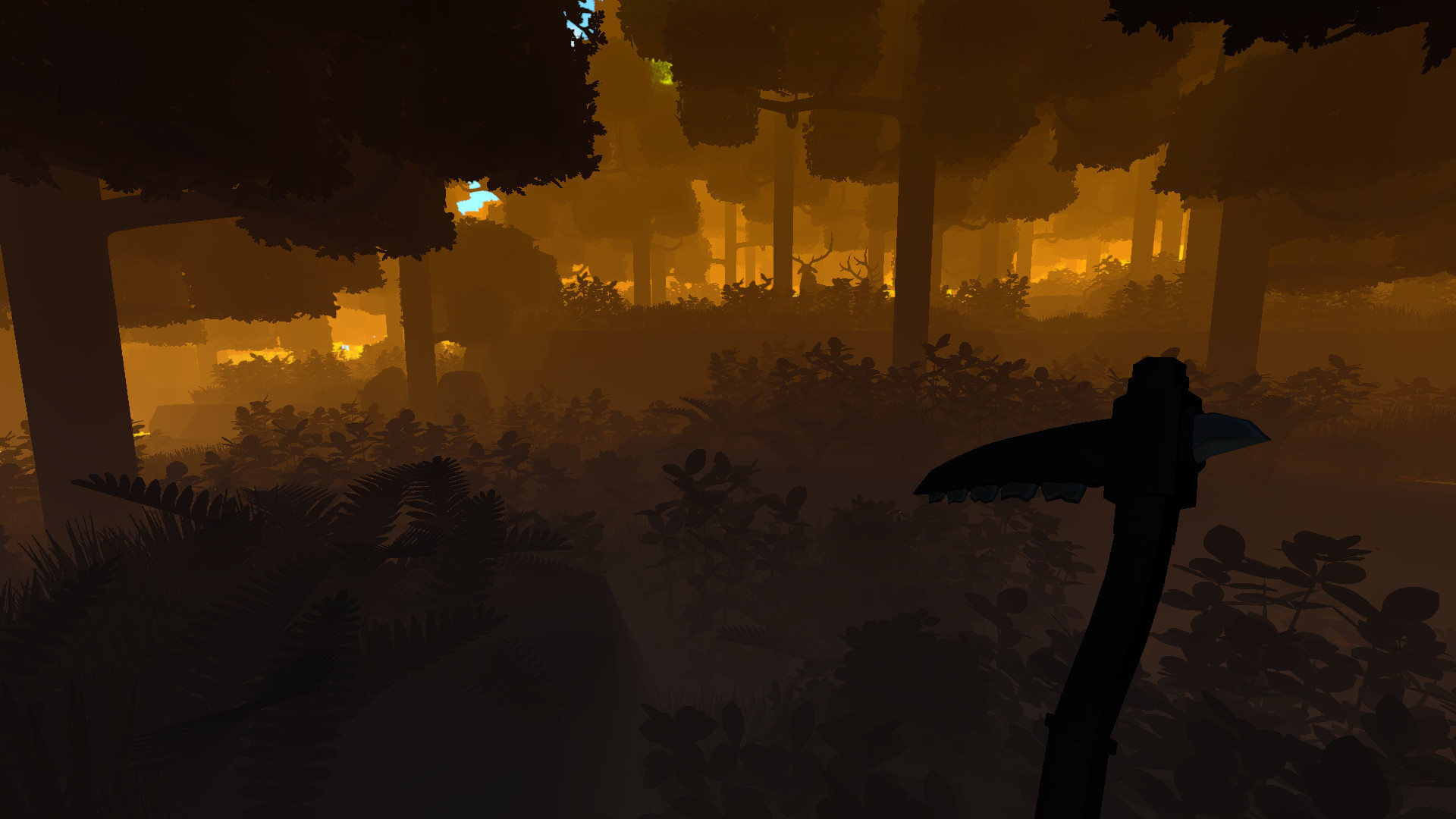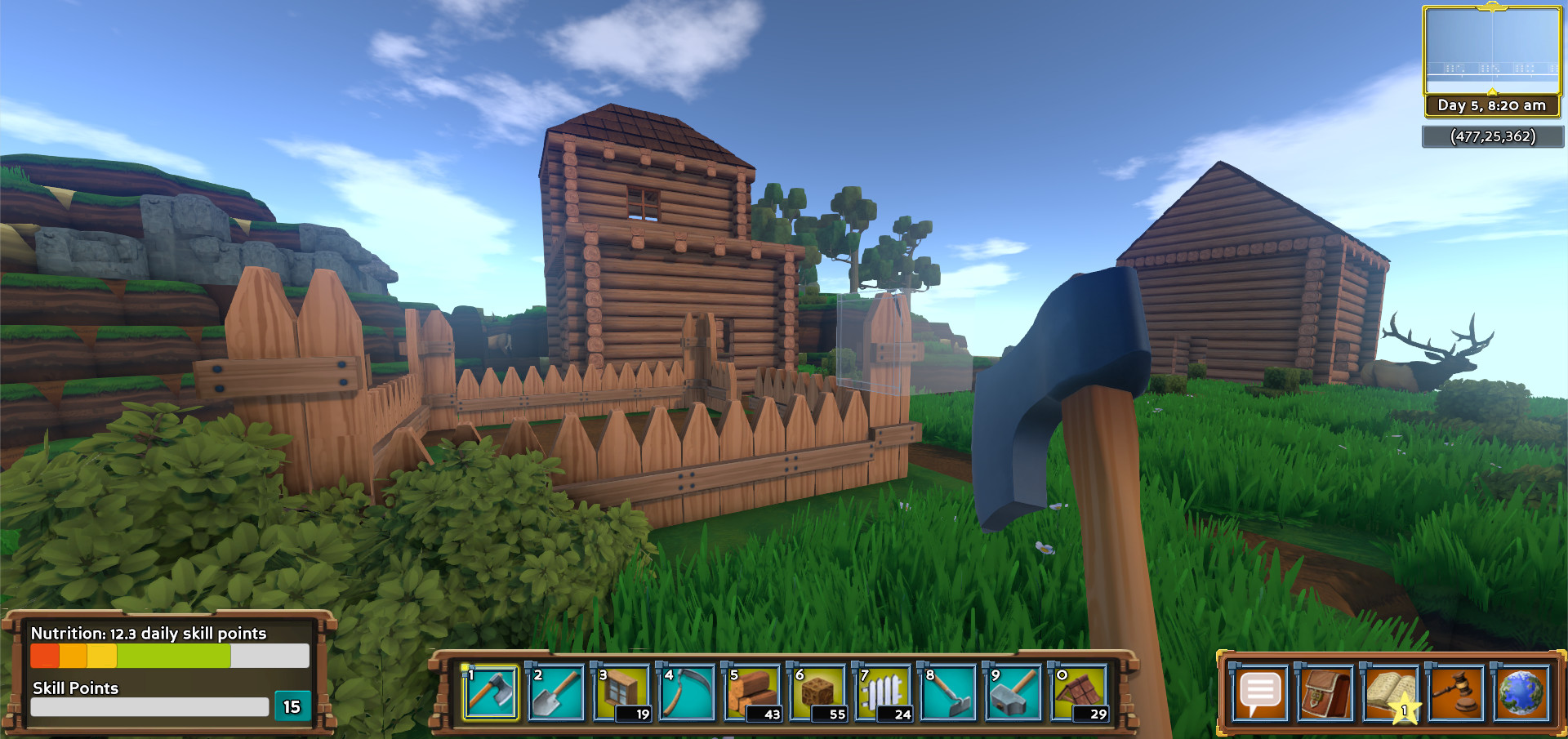Enter the world of Eco, where you must team-up to build civilization and prevent a disaster, using resources from a fully simulated ecosystem, where your every action affects the lives of countless species.
Will you and your fellow builders collaborate successfully, creating laws to guide player actions, finding a balance that takes from the ecosystem without damaging it? Or will the world be destroyed by short-sighted choices that pollute the environment in exchange for immediate resource gains? Or, do players act too slowly, and the world is consumed by a disaster that could have been avoided if you developed the right technology? In Eco, you must find a balance as a group if the world is to survive.
Enter humans into this equation, and things get complicated. It is the role of players to thrive in this environment by using resources from the world to eat, build, discover, learn and invent. However, every resource they take affects the environment it is taken from, and without careful planning and understanding of the ecosystem, lands can become deforested and polluted, habitats destroyed, and species left extinct.
In the extreme, the food supply of the ecosystem can be destroyed, along with all human life on it, resulting in server-wide perma-death. Eco is a game where the player’s actions have meaningful consequences.
Will you and your fellow builders collaborate successfully, creating laws to guide player actions, finding a balance that takes from the ecosystem without damaging it? Or will the world be destroyed by short-sighted choices that pollute the environment in exchange for immediate resource gains? Or, do players act too slowly, and the world is consumed by a disaster that could have been avoided if you developed the right technology? In Eco, you must find a balance as a group if the world is to survive.
A world-survival game
Eco is a survival game in a global sense, where it is not just the individual or group who is threatened, but the world itself. The world of Eco will be home to a population of thousands of simulated plants and animals of dozens of species, each living out their lives on a server running 24 hours a day, growing, feeding and reproducing, with their existence highly dependent on other species.Enter humans into this equation, and things get complicated. It is the role of players to thrive in this environment by using resources from the world to eat, build, discover, learn and invent. However, every resource they take affects the environment it is taken from, and without careful planning and understanding of the ecosystem, lands can become deforested and polluted, habitats destroyed, and species left extinct.
In the extreme, the food supply of the ecosystem can be destroyed, along with all human life on it, resulting in server-wide perma-death. Eco is a game where the player’s actions have meaningful consequences.
- Everything you do affects the ecosystem, and players can destroy their food supply and world (server-wide permadeath)
- Create a player-run government to make decisions as a group, proposing and voting on laws
- Use data gathered from the world to propose and vote on laws as a group. Debate with scientific argumentation.
- Create a player-run economy that allows you to sell not only good but services in the form of server-enforced contracts (simulating a player driven quest system).
- Your food level determines your skill-increase rate, making food very important and tying players directly to the ecosystem from which it comes.
- A game with goals higher than entertainment. We plan to build it for schools as an augmented classroom world students share.
Developer Blog: Laws Part II - Taxes, Ownership, Property and Wealth
New Government system: Constitution
New Government system: Elections and Elected Titles
New Government system: Demographics and Wages
New Government system: Laws Part 1: Using the system (This blog)
New Government system: Laws Part 2: Taxes, Ownership, Property, and Wealth (This blog) New Government system: Laws Part 3: Tour of different actions, and Executive Actions New Government system: Districts
New Crafting: Work Parties
New Crafting: Labor System
New Crafting: Modules and Efficiency Redesign
New Crafting: New Tech Tree
New Building System: Hammer and new Building Styles
New Mining System: Mineral Dispersion and Drill Usage
New Mining System: New Processing Path and Pollution Info
New Animal System: Attacking Animals New Ecopedia System
New UI
New Audio (This blog)
New Hosted Worlds System[/olist]For those have been following, the Law system is fundamental to a lot of the systems in Eco, and with 9.0 weve built it out to be very extendable and powerful. It can have all kinds of effects triggered by the world, and affecting the world in specific ways. Lets look at a few of them.

We can set which sources will specifically trigger this:

In this case, since its for roads, we can make the vehicles that pollute be the ones that pay it, so we can limit it to just vehicle pollution via this dialog:

Next we setup the action to take when this trigger happens. We can assign a tax:

Here weve set the amount paid to be relative to the amount of the pollution. This is selected as a game value, which through the dropdown can be changed to many different types of calculations:

However, since the truck pollutes relatively slowly, this is going to be a low amount of tax. You can see this on the tooltip for the truck:

0.1 PPM per hour means youd have to drive around for an hour before only paying .1 in tax. Not enough. We can amp this up with an arithmetic operation inserted in there, performing a calculation to get the amount to tax:

Here the rate is taxed amount it multiplied by 100, making it a much more meaningful amount.
And submit!

Notice the law hieroglyphics which give you an idea of what the law is about (pollution + tax).
Once this makes it into law, driving around in a polluting vehicle will slowly move funds into the treasury:

This notice pops up showing you the amount youre paying each tick while driving. And we can see by clicking on the treasury, its starting to fill up:

To note here, the full transaction record of all bank accounts is public knowledge in Eco, meaning you can explore how the whole economy works. This is of course not how the real world works, but that extra transparency lets you peer behind the curtain, see how the inner economic machine functions, and understand it better. We might make it possible to have private transactions later, which will allow nefarious white color crime a bit easier which should be something players have to contend with.
Now we can create the second part, the Spend clause that puts that money to use.

Here it detects construction of road items, and if youre constructing them pays you out of the treasury. To keep a balance, if you deconstruct a road it charges you. So theres an incentive to build roads, but you cant just build and destroy the same piece over and over.
Now the law icons grew a bit to show these extra detections:

Now when you destroy road you pay, and when you build you get paid:

This shows how you can use multi-part laws to do connect parts of your world and add economic incentives/disincentives as needed.



And then use the new Change Property Owner legal action to move it to ownership of a government title (see blog ) for redistribution:

Now we have a fail-safe for a common problem in Eco, players who abandon a world clogging up the space with their claimed property. By making the solution something thats implemented through the law system, players get to decide what is the fairest way to handle that redistribution as part of the government decision making process.

This will run an action on every member of Abandoned, every 24 hours. The trigger it runs can detect the wealth and tax based on that:

Here it performs a calculation, taking 10 percent of the players wealth in the given currency. You can see in the Wealth tooltip what its doing exactly:

It looks at non-government accounts, and for multiply owned accounts it takes a pro-rated amount. So, no stashing those funds in overseas accounts, the government will still find you.
This just scratches the surface of what you can do with laws, and its really cool to see what kind of societies players are creating in our 9.0 playtests with these tools, from very complex and byzantine law structures to simple flat taxes. All kinds of societal experiments that play out within the game, one of my favorite things about it.
Thanks for reading and being patient as we finish up 9.0, its coming soon, we plan to announce a release date in the next few-several weeks. If you want to get your hands on it early and give us feedback, chat to us on Discord and you may be able to join one of our playtests.
Also, as usual I'll be covering the contents of this blog in our next livestream this Saturday at 11am (11:00) PDT / 8pm (20:00) CEST, drop by and ask me your questions!
- John K., CEO, Strange Loop Games
Hey all, as we work down the home stretch of big-fixing and optimizations for 9.0, I wanted to talk more about the law system in the game and how its expanded and will support much of the future progress of Eco.

As always, let's start with the overview over our Eco Update 9.0 Blogs:[olist]
Taxes
One of the legal actions you can trigger with laws is currency transfers, either taxing the player or paying them (when incentivizing something). Lets set up a law that does both. We can make a law that detects a negative action, say Pollute Air and taxes it:
We can set which sources will specifically trigger this:

In this case, since its for roads, we can make the vehicles that pollute be the ones that pay it, so we can limit it to just vehicle pollution via this dialog:

Next we setup the action to take when this trigger happens. We can assign a tax:

Here weve set the amount paid to be relative to the amount of the pollution. This is selected as a game value, which through the dropdown can be changed to many different types of calculations:

However, since the truck pollutes relatively slowly, this is going to be a low amount of tax. You can see this on the tooltip for the truck:

0.1 PPM per hour means youd have to drive around for an hour before only paying .1 in tax. Not enough. We can amp this up with an arithmetic operation inserted in there, performing a calculation to get the amount to tax:

Here the rate is taxed amount it multiplied by 100, making it a much more meaningful amount.
And submit!

Notice the law hieroglyphics which give you an idea of what the law is about (pollution + tax).
Once this makes it into law, driving around in a polluting vehicle will slowly move funds into the treasury:

This notice pops up showing you the amount youre paying each tick while driving. And we can see by clicking on the treasury, its starting to fill up:

To note here, the full transaction record of all bank accounts is public knowledge in Eco, meaning you can explore how the whole economy works. This is of course not how the real world works, but that extra transparency lets you peer behind the curtain, see how the inner economic machine functions, and understand it better. We might make it possible to have private transactions later, which will allow nefarious white color crime a bit easier which should be something players have to contend with.
Now we can create the second part, the Spend clause that puts that money to use.

Here it detects construction of road items, and if youre constructing them pays you out of the treasury. To keep a balance, if you deconstruct a road it charges you. So theres an incentive to build roads, but you cant just build and destroy the same piece over and over.
Now the law icons grew a bit to show these extra detections:

Now when you destroy road you pay, and when you build you get paid:

This shows how you can use multi-part laws to do connect parts of your world and add economic incentives/disincentives as needed.
Ownership and Property
Ownership is another one you can change now, with a legal action to change property owners. We can make a law that uses the new Demographic system (see blog ) to restore abandoned land to the commons. We check when a user first enters the abandoned demographic:


And then use the new Change Property Owner legal action to move it to ownership of a government title (see blog ) for redistribution:

Now we have a fail-safe for a common problem in Eco, players who abandon a world clogging up the space with their claimed property. By making the solution something thats implemented through the law system, players get to decide what is the fairest way to handle that redistribution as part of the government decision making process.
Wealth
The last example Ill give is using the concept of wealth in laws. For example, we can make a wealth tax on a timer. Selecting the Citizen Timer trigger will run a law on a specified period:
This will run an action on every member of Abandoned, every 24 hours. The trigger it runs can detect the wealth and tax based on that:

Here it performs a calculation, taking 10 percent of the players wealth in the given currency. You can see in the Wealth tooltip what its doing exactly:

It looks at non-government accounts, and for multiply owned accounts it takes a pro-rated amount. So, no stashing those funds in overseas accounts, the government will still find you.
This just scratches the surface of what you can do with laws, and its really cool to see what kind of societies players are creating in our 9.0 playtests with these tools, from very complex and byzantine law structures to simple flat taxes. All kinds of societal experiments that play out within the game, one of my favorite things about it.
Thanks for reading and being patient as we finish up 9.0, its coming soon, we plan to announce a release date in the next few-several weeks. If you want to get your hands on it early and give us feedback, chat to us on Discord and you may be able to join one of our playtests.
Also, as usual I'll be covering the contents of this blog in our next livestream this Saturday at 11am (11:00) PDT / 8pm (20:00) CEST, drop by and ask me your questions!
- John K., CEO, Strange Loop Games
[ 2020-07-10 13:44:55 CET ] [Original Post]
Minimum Setup
- Processor: Intel Dual-Core 2.4 GHz or AMD Dual-Core Athlon 2.5 GHzMemory: 2 GB RAM
- Memory: 2 GB RAM
- Graphics: NVIDIA GeForce GT 440 or AMD Radeon HD 5850 or Intel HD Graphics 4000 with 512 MBNetwork: Broadband Internet connection
- Storage: 2 GB available space
Recommended Setup
- Processor: Intel Core i5-2300 or AMD Phenom II X4 940 or betterMemory: 4 GB RAM
- Graphics: NVIDIA GeForce GTX 570 or AMD Radeon HD 7750 with 1 GB VRAM or betterNetwork: Broadband Internet connection
- Storage: 2 GB available space
GAMEBILLET
[ 6401 ]
FANATICAL
[ 6147 ]
GAMERSGATE
[ 2652 ]
MacGameStore
[ 4909 ]
FANATICAL BUNDLES
HUMBLE BUNDLES
by buying games/dlcs from affiliate links you are supporting tuxDB

